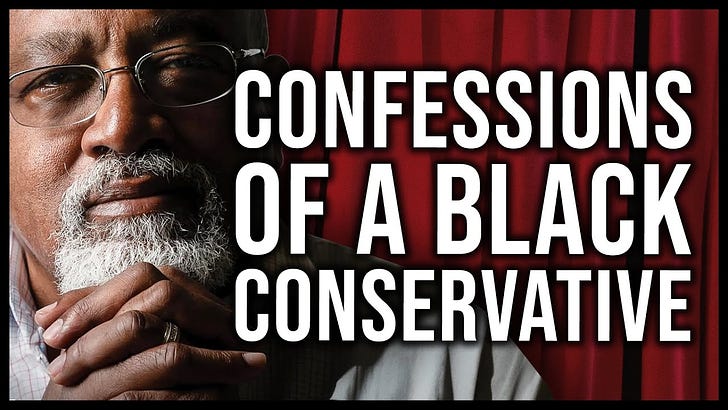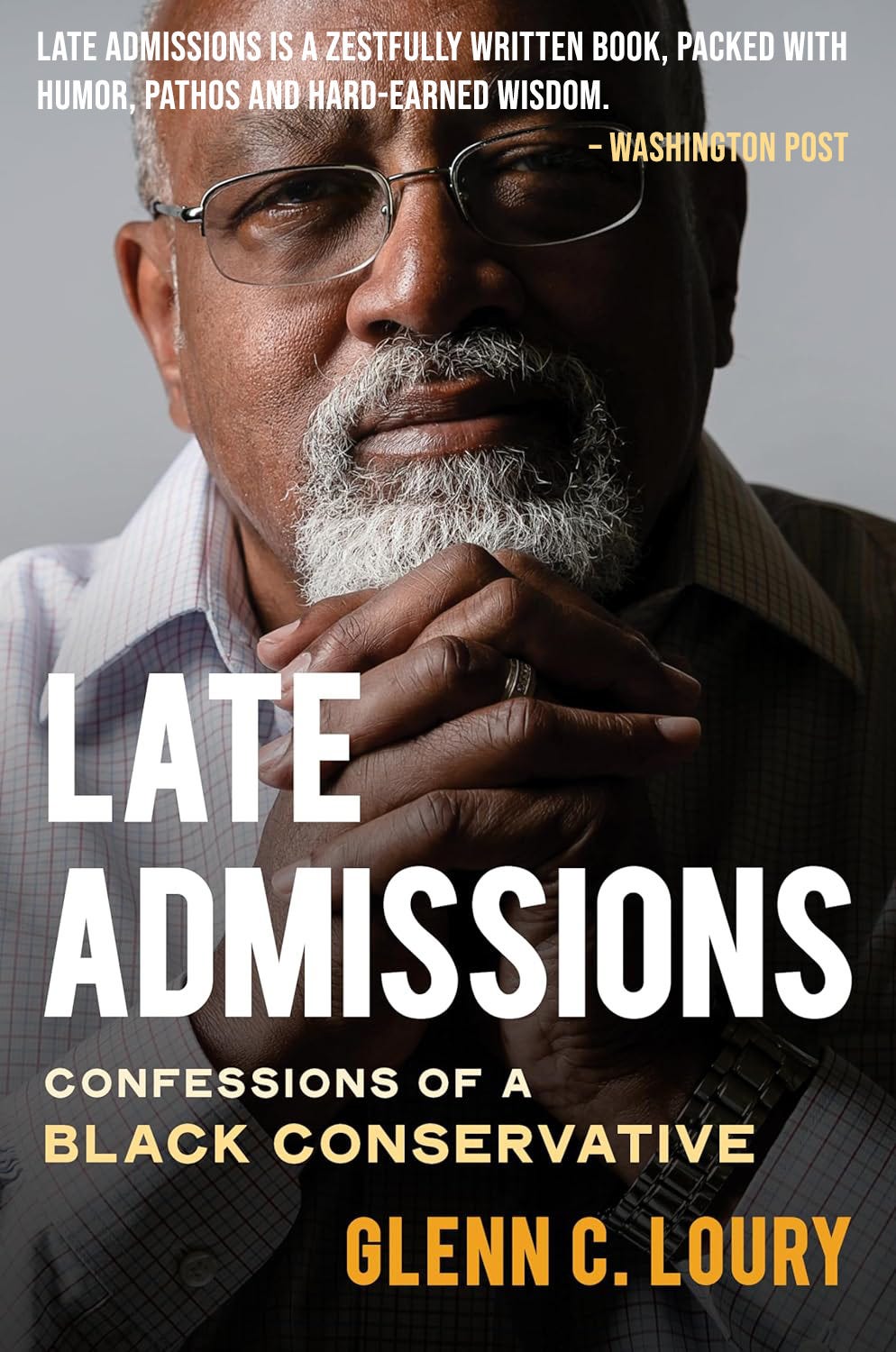Today’s the day! My memoir is out. I know I’ve been hyping the release of Late Admissions: Confessions of a Black Conservative pretty frequently in this space, but I can’t help myself: I’m excited (and a little nervous) to share it with the world. I’ve seen that some who preordered the book have already received their copies, and it’s so gratifying to know that people are spending their time and money on something I’ve worked so hard on.
The reviews and profiles are rolling in, too. You can read what the critics think at the New York Times, the Washington Post, the Wall Street Journal, Spiked, and the Florida Courier. Both the New York Times and the Chronicle of Higher Education have published profiles of yours truly. And I’m making the podcast rounds. I spoke with Meghan Daum, Russ Roberts at EconTalk, and my great friend Larry Kotlikoff about the book and my life. I’ll continue to link to reviews, features, and conversations as they roll out.
John and I spoke about the book in our conversation this week. He brought up something interesting: as of yet, no black writer has written about the book. You don’t need to be black to enjoy it, of course. But it’s interesting to me that, not so long ago, one would have expected publications to assign reviews and stories only to black writers or at least mostly to black writers. Personally, I like that Late Admissions isn’t being received solely as a “black book”—indeed, I had hoped it wouldn’t be. And yet I’m curious to know what a black critic conversant in the African American literary tradition would have to say about it. Consider that an open invitation!
This is a clip from the episode that went out to paying subscribers on Monday. To get access to the full episode, as well as an ad-free podcast feed, Q&As, and other exclusive content and benefits, click below.
GLENN LOURY: I want to talk about my book, because today is May 11. My book is being published on May 14 by W.W. Norton & Company. My book is called Late Admissions: Confessions of a Black Conservative. It's available for preorder now, and it'll be available for sale. And there's an audiobook, which I read myself. Three days in a booth in New York going through 439 pages of my book.
JOHN MCWHORTER: Nobody knows how hard that is. My hat's off to you. That's a lot.
It's an autobiography. It's a story of my life, from being a kid in Chicago through MIT graduate school, through my early academic career, through my political machinations, through my various personal challenges and turmoils, through marriages and grandchildren and all the rest.
“So Glenn, have there been any reviews?” I asked. Audience, of course I know that there have been some.
I'm so glad you asked! So your colleague, Pamela Paul, has done a feature at the Times where she interviewed me. She came here to my home in Providence, Rhode Island. And it's a good piece. I think it's a very positive piece on the book and on me, warts and all. And there's been a review in the Wall Street Journal by Tunku Varadarajan, the staff writer there at the Wall Street Journal who did a profile of me a couple of years ago. He's got a review which is, I think, very positive and reveals a sensitive engagement with the book.
And then there's a review in the Washington Post by a gentleman, John McMillan is his name. He's an academic at Georgia State University. He's a historian who's been writing about American political culture and the post-1960s era. His academic work, I don't know his credits beyond that. But the review gets the book. It gets what I'm trying to do in the book and appreciates it.
Thank you for allowing me this extended discussion of my book, John. Just to fix ideas here, what am I after in the book? I'm after engagement with the problem of self-regard, with the existential challenge of taking the measure of one's own life and trying to communicate that, which is what the book is. And the pitfalls of self-delusion and the games we play with ourselves, the cover stories, the rationalizations, the self-aggrandizement. I enter into a cooperative relationship with the reader. I say, look, we got a problem here. I'm trying to tell you about my life. You try to know about my life, but I'm doing the telling. Obviously I have an incentive to make myself look good. You know that. So obviously you're gonna be looking with a scant eye at how it is that I portray myself.
And so we have a game here, and there are layers. There are layers in that game. In the telling of the story, I discover the games I've been playing with myself throughout my life, in my relationships, in my work, in my personal life in my politics, the left and the right, who are my allies, who are my enemies, what do I really stand for, who am I, in my racial identity, the effort to live up to ideals that I think other people have about me, the constant struggle to live in good faith. That's the book.
And it's a great book. There should be a black reviewer. The one thing that I'm noticing is that I'm not hearing that. I think that would be an interesting additional perspective. I'm not talking about myself. I wouldn't be allowed. If the New Yorker is listening, you should put Vincent Cunningham on this. Or if he's not available, give it to Jelani Cobb. Atlantic: Hannah Giorgis. I would be interested in knowing what she thought of this one. To be honest, I don't think Ibram Kendi would be a good fit. But there is another... I'm blanking. There's great guy, black writer that the Atlantic has been using lately. Oh, wait a minute. I can't remember his name, but put Tyler Austin Harper on this, for example.
Everybody who reviews it is not supposed to be not black. Just saying that to the mediasphere out there.
I accept that useful comment.
I wonder if some black writers or reviewers are turning it down. Because what I'm just suggesting is not exactly a novel request. Why is nobody black? I'm guessing too far. I don't know.
We're early on. These organs presumably will engage the book in one way or another and we'll find out whether or not they have a black person to do it. I'm not privy to who all is being assigned.
Washington Post, get Michael Eric Dyson, please, or Gerald Early or someone like that.
Oh, Gerald. I'd love for Gerald to read this book.
Yeah.
I have great respect for Gerald Early.
He's the real deal.





Glenn, I received your book today, so chuffed, cant wait to read, thank you
Looks like Amazon does sell a Kindle version, it has to be ordered from the website, not the app. I’ll get the hardcover later to show off my big brain, “yeah, I read, no big deal”